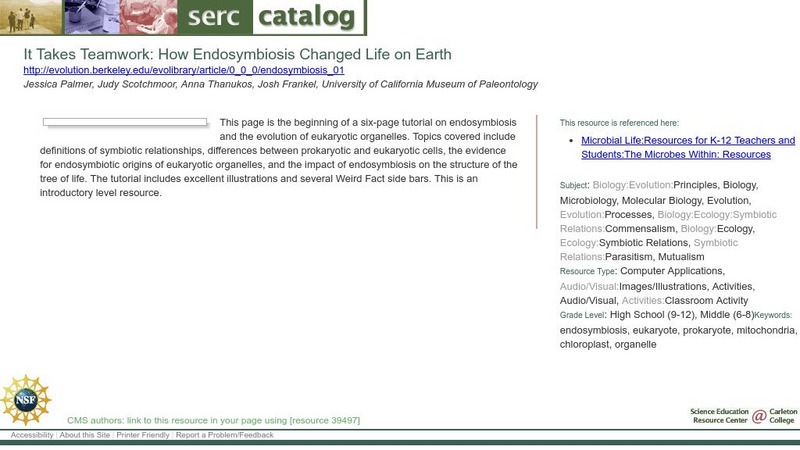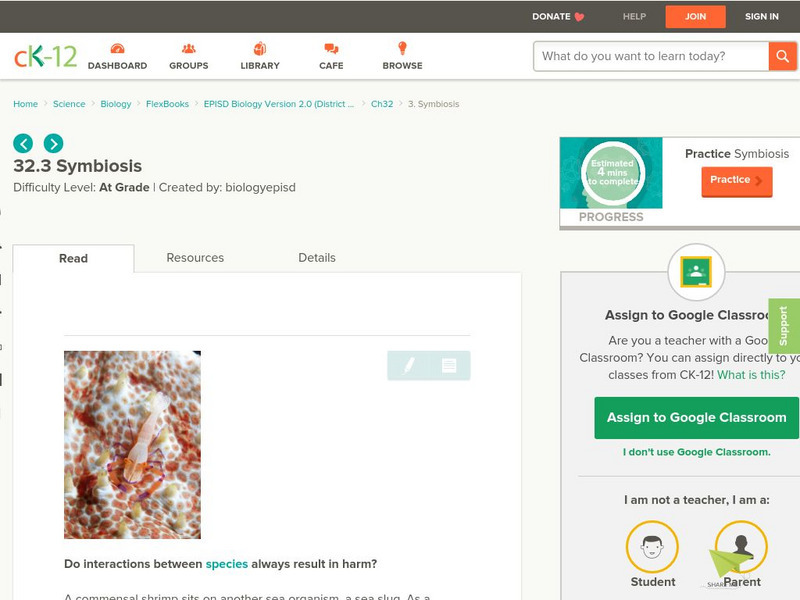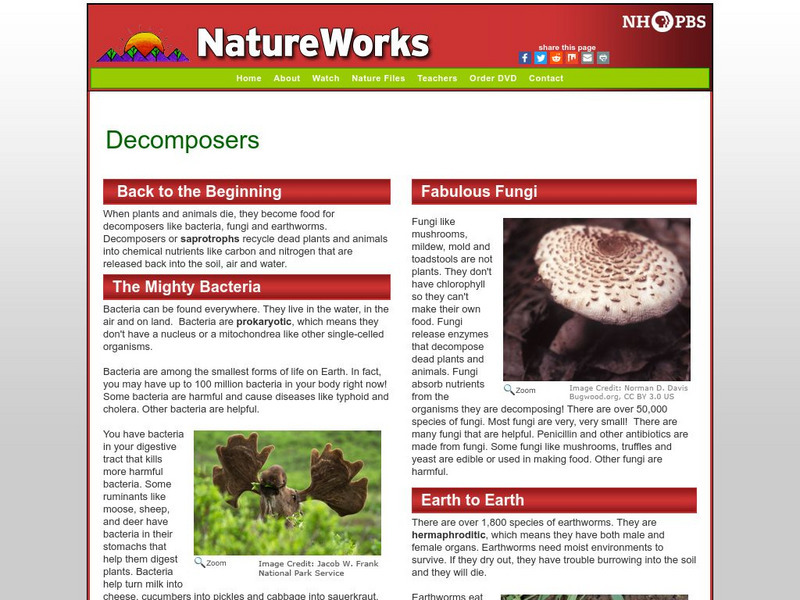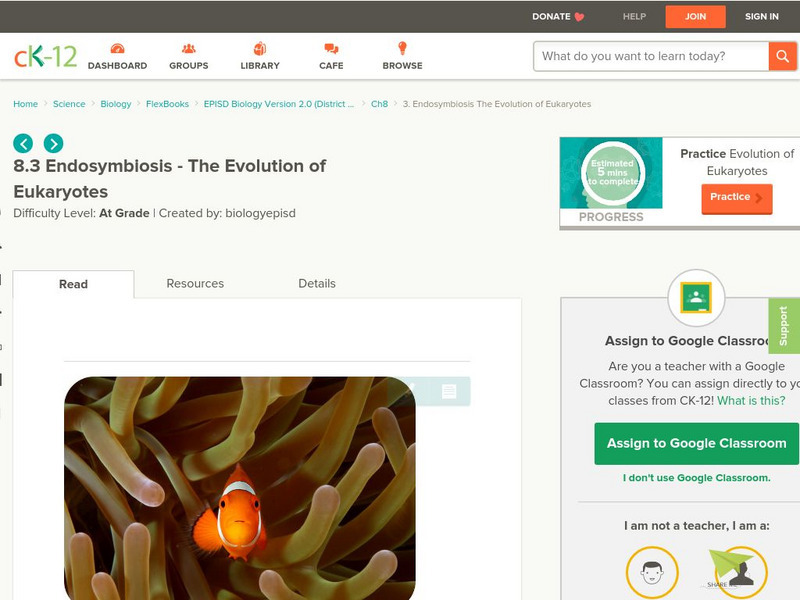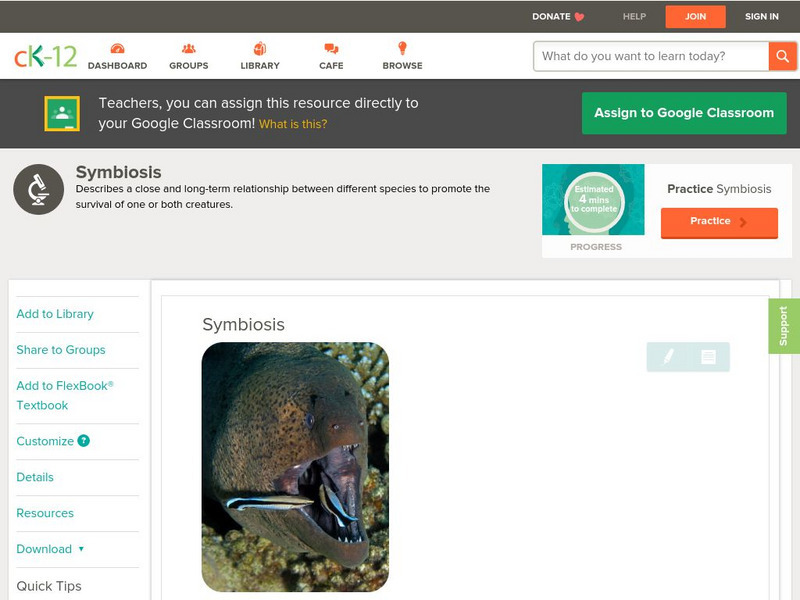Science Education Resource Center at Carleton College
Serc: It Takes Teamwork: How Endosymbiosis Changed Life on Earth
A tutorial on symbiotic relationships that explores the differences between prokaryotic and eukaryotic cells as well as the origins of eukaryotic organelles possibly being from endosymbiotic relationship. This tutorial also offers...
CK-12 Foundation
Ck 12: Episd: Symbiosis
[Free Registration/Login may be required to access all resource tools.] Identify and understand the various types of symbiotic relationships. Recognize the three primary kinds of symbiosis.
University of Hamburg
University of Hamburg: Symbiosis & Normal Microbiota
A diagram of the different types of symbiosis. There are 4 examples of symbiotic relationships and explanations. Read this page and then give yourself a quiz.
University of South Florida
Project Oceanography: Single Celled Organisms [Pdf]
For this lesson, students explore three kinds of symbiotic relationships involving unicellular organisms. They will also look more closely at the relationship between zooxanthellae and coral, and the importance of nitrogen-fixing...
Science Struck
Science Struck: Symbiotic Relationships in the Rainforest
Explains what mutualism, commensalism, and parasitism are.
Science Struck
Science Struck: Symbiotic Relationships in the Tundra
Explains what mutualism, commensalism, and parasitism look like in a tundra biome.
Science Struck
Science Struck: Mutualism Relationships
Learn how mutualism benefits the organisms in a symbiotic relationship and what the different types of mutualism are. Provides lots of examples.
TED Talks
Ted: Ted Ed: How We Think Complex Cells Evolved
Adam Jacobson explains endosymbiosis, a type of symbiosis in which one symbiotic organism lives inside another. [5:42]
PBS
Nh Pbs: Nature Works: Decomposers
This site gives a detailed overview of "decomposers": bacteria, fungi, and earthworms. Content includes a look at how decomposers contribute to a symbiotic relationship.
CK-12 Foundation
Ck 12: Life Science: 12.9 Symbiosis
Learn about the many types of symbiotic relationships in an ecosystem.
CommonLit
Common Lit: Clownfish and Sea Anemone
Clownfish and sea anemone have a special relationship-a "symbiotic relationship." As you read, take notes on the specific ways in which clownfish and sea anemones contribute to their symbiotic relationship. It also offers a guided...
University of Nebraska
University of Nebraska State Museum: Brazil Nut Tree Community
Investigate the numerous symbiotic relationships that exist between the Brazilian Nut Tree and six other organisms in its community.
PBS
Pbs Teachers: Volcanoes of the Deep
Discuss how individual organisms and groups of organisms interact with each other, and research and classify symbiotic relationships between individual organisms of different species.
BiologyWise
Biology Wise: What Are Nitrogen Fixing Bacteria
Describes symbiotic relationship between leguminous plants and nitrogen-fixing bacteria. Explains the mechanism the bacteria use to fix nitrogen, the chemical formula involved, and different types of nitrogen-fixing bacteria.
CK-12 Foundation
Ck 12: Life Science: 6.11 Fungi Symbiosis
Explore the symbiotic relationships involving fungi.
Other
Pde Sas: Relationships Among Organisms
In this lesson, young scholars compare various types of relationships among organisms (i.e., biotic interactions). Students will: explain the roles of producers and consumers, and predators and prey in an ecosystem. Explain the levels of...
Encyclopedia of Earth
Encyclopedia of Earth: Ecology: Lichen
Article describing the different categories of lichens, their physical features, how they reproduce, their evolution, and important benefits lichens provide to humans. (Published: July 19, 2010)
CK-12 Foundation
Ck 12: Endosymbiosis the Evolution of Eukaryotes
[Free Registration/Login may be required to access all resource tools.] Learn about the evolution of eukaryotes which is explained by the endosymbiotic theory.
CK-12 Foundation
Ck 12: Episd: Evolution of Eukaryotes
[Free Registration/Login may be required to access all resource tools.] Take a close look at the endosymbiotic theory scientists have developed to explain the evolution of eukaryotes. Understand that chloroplast and mitochondria used to...
DOGO Media
Dogo News: Always Craving Cookies? Blame It on Your Gut Bacteria
Learn about how the bacteria in your digestive system influence the decisions you make about the food you eat.
CK-12 Foundation
Ck 12: Episd: Coevolution
[Free Registration/Login may be required to access all resource tools.] Find out how coevolution can occur in nature and identify the endosymbiotic theory.
CK-12 Foundation
Ck 12: Life Science: Symbiosis
[Free Registration/Login may be required to access all resource tools.] Symbiosis describes a close and long-term relationship between different species. At least one species will benefit in a symbiotic relationship. There are three...
TED Talks
Ted: Ted Ed: The Networked Beauty of Forests
Deforestation causes more greenhouse gas emissions than all trains, planes and automobiles combined. Suzanne Simard examines how the complex, symbiotic networks of our forests mimic our own neural and social networks- and how those...
TED Talks
Ted: Ted Ed: The Rise of Human Computer Cooperation
Brute computing force alone can't solve the world's problems. Data mining innovator Shyam Sankar explains why solving big problems is not a question of finding the right algorithm, but rather the right symbiotic relationship between...
Other popular searches
- Symbiotic Relationships
- 5 Symbiotic Relationship
- Good Buddies Symbiotic
- Good Buddy Symbiotic
- Symbiotic Relations
- Symbiotic Interactions
- Symbiotic Relationshios
- Relationships Symbiotic Dog


